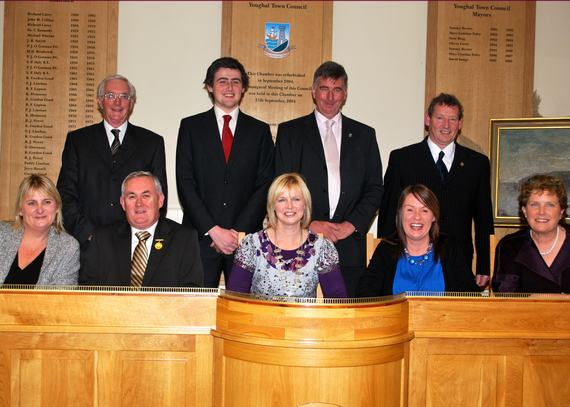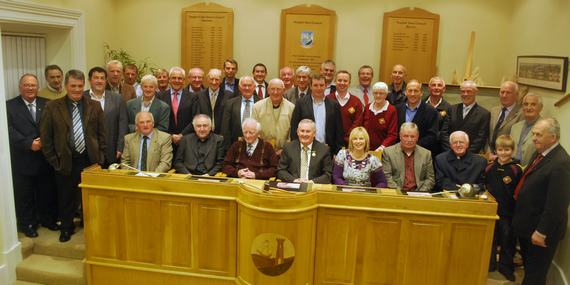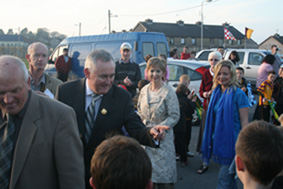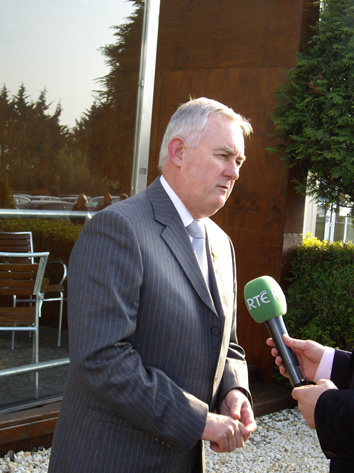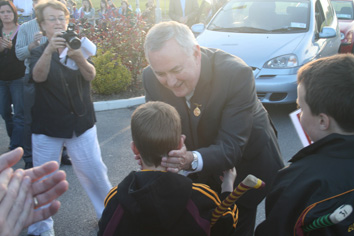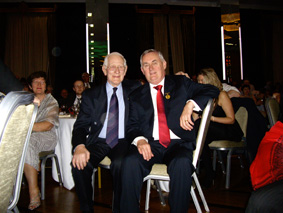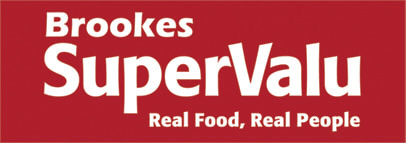CHRISTY COONEYChristy Cooney (Críostóir Ó Cuana) was born in 1952 in youghal) Christy has not only served in various positions within Youghal GAA he has served in many GAA Supporting positions at county and national Level.
|
ARTICLES/LINKS
|
Youghal Town Council accord a civic reception to Christy Cooney, President of the GAA
Youghal Town Council accorded a civic reception to Youghal man Christy Cooney, President of the GAA at the council chambers on Monday night (19th Oct. 2009). A large audience representing members of Youghal GAA club and Christy’s family and friends were present to honour the Youghal native who heads the largest sporting organisation in the country.
|
Speech by Mayor of Youghal Sandra McLellan at the civic reception held in The Mall House to honour Youghal native Christy Cooney, President of the GAA
“Distinguished Guests, Ladies and Gentlemen,
I would like to welcome you all here this evening. On behalf of Youghal Town Council it gives me great pleasure to honour Christy Cooney, a native of Youghal with this Civic Reception in recognition of his achievement in becoming president of the Gaelic Athletic Association. Christy has given a lifetime service to the G.A.A. both as a player and administrator at all levels. He was secretary of the Youghal Juvenile Club at just 16 years of age. He represented Youghal at both East Cork and County Level and held every position within the Youghal Club down through the years. He was also Chairman of the Youghal Club for 2 terms, Chairman of the Cork County Board, Chairman of the Munster Council and now currently President of the GAA. Id like to pay tribute to all of Christys family especially his wife Ann, his daughter Edel, and his son Patrick who lives in Australia because I know it was a team effort. Id also like to mention Christys parents Paddy and Agnes who would have been very proud of him. Christy, The people of Youghal are very proud of you on your fantastic achievement and I am delighted all your hard work and dedication has paid off.” More photos of the night can be found at http://www.youghalonline.com/2009/10/19/youghal-town-council-accord-a-civic-reception-for-youghal-man-christy-cooney-president-of-the-gaa/ |
Home is the hero as Youghal celebrates Christy Cooney
Youghal hero Christy Cooney enjoyed a Herculean homecoming to celebrate his inauguration as GAA President on April 18th. A day later, the 57 year-old head of the country’s premier sporting organisation was ferried on a raucous, horn-blowing, hazards-flashing lap of honour round the town from his home in Copperalley. Having sanctified the main thoroughfares and all on them, the presidential cavalcade terminated at Youghal GAA’s Club Aras headquarters on Magners Hill, at 7pm. Amidst considerable Christy-chaos, the most awaited man in town was afforded a guard of honour from the joy-filled boys and girls of Youghal’s Juvenile sector as he entered the club. Within, the celebrations would unfold like a second half dream. An Uachtaran was joined by his wife Anne, daughter Edele, siblings Daithi, Pa, Brendan, Kevin and Angela, extended family and just about everyone in Youghal who ever watched an umpire raise a flag, for a night of bia, deoch, sceal, ceol agus amhran. The President’s son Patrick, currently resident in Australia, had watched the Congress proceedings via RTE’s website streaming, but doubtless he will some day review TV3’s footage of grassroots gra at its greatest in Club Aras. Comhaltas Craobh Eochaille performed to the international standard for which Ireland’s most-travelled Comhaltas branch is renowned, while every heart pulsed to the rhythm of pride. The President graciously and gratefully accepted gifts from various organisations, including Youghal camogie club, Youghal GAA’s Juvenile sector and the Youghal GAA club itself, which presented him with a unique pencil-painting of the Copperally playing arena from the extremely talented hands of Youghal artist Paul Daly. It was, perhaps, as much Youghal GAA club’s night as it was Christy Cooney’s as the reflected glory of its son’s achievement transformed to a national spotlight. The search for glory on the field had, for awhile, given way to the celebration of success away from it. On Monday, President Cooney awoke from what was surely a brief night’s sleep to undertake a tour of local schools, where further plaudits, tokens, presentations and handshakes were given and received. It was a pleasant and deserved interlude before he confronts the infinitely more daunting encounters with the GPA, sponsorship, rules changes, discipline, player welfare, provincial games, ticket allocations, the Aussies, fixture congestion, global recession and reduced income once Lansdowne Road is re-opened. Who knows where that Sunday cavalcade through Youghal was really bringing him?! end
Christy Cooney 36th Uchtaran Don Cumann Luthcleas Gael, Comes Home To Celebrate
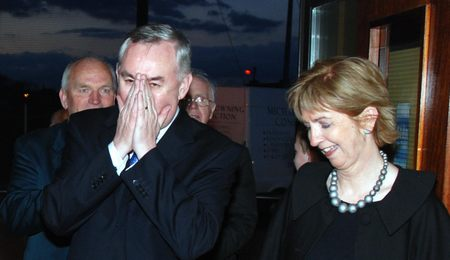
President-Elect of the GAA Mr. Christy Cooney and his wife Ann arrive home to a heroes welcome
GAA President-in-waiting Christy Cooney returned to his Youghal base in a fanfare of deep pride and emotion last Sunday night. At first, a few friends and supporters welcomed the Association’s elected leader as he stepped from his car in the Club Aras headquarters. Dressed in a navy suit, white shirt and sky blue tie, the man who had 60 votes to spare at Congress a day before, now had time to spare for local associates as he smilingly accepted the heartfelt handshakes and hugs from people visibly moved with pride in his achievement. Read on
GAA President-in-waiting Christy Cooney returned to his Youghal base in a fanfare of deep pride and emotion last Sunday night. At first, a few friends and supporters welcomed the Association’s elected leader as he stepped from his car in the Club Aras headquarters. Dressed in a navy suit, white shirt and sky blue tie, the man who had 60 votes to spare at Congress a day before, now had time to spare for local associates as he smilingly accepted the heartfelt handshakes and hugs from people visibly moved with pride in his achievement. Read on
President Cooney
CHRISTY COONEY, INCOMING GAA PRESIDENT TALKS TO CHRISTY PARKER ON THE EVE OF TAKING UP HIS APPOINTMENT.
There was great celebration in Youghal when Christy Cooney became President-in-waiting of the GAA last April. His triumphant homecoming, his emotional address and the ensuing tributes saw nostalgia congeal with anticipation. Now the waiting is over. On April 17th, Congress convenes again. This time Christy Cooney will depart as the 36th President of the GAA. In the early months, the GAA awakes like a yawning bear but in Christy’s case it will be a long awakening. For three years the Fas senior executive will swap careers to lead Ireland’s main sporting body. From his home, a free kick from Youghal GAA’s Copperalley pitch, he says the dream has already given way to reality. “Since January I’ve been chairing a national committee, working with Nicky Brennan to ensure a smooth transition and preparing my address for Congress,” he informs. He has been organising “about 36 committees, involving almost 300 people who I think will deliver what is best for the Association.” Then there’s the Strategic Policy 2009-15 to contemplate, involving all aspects, from rules to marketing to discipline and so on. So yes, “there’s been lots of consulting.”
There’s more. It remains nigh impossible to look at a hurley, let alone a GAA president, without mentioning Cork’s recent civil war. “That took up time too,” he volunteers. He strongly supports the elevation of Denis Walsh to senior coach and endorses the addition of Denis Coughlan, Jimmy Barry-Murphy and John Fenton to the mix. He regrets the “trauma suffered by Gerald McCarthy, who is a very honourable guy and who did excellent work for Cork hurling” and hopes nothing similar is ever repeated. “People need step back and realise its just sport.” While rueful that Cork GAA “washed its dirty linen in public,” he recognises that, longterm, “if all sides learn lessons from it, it may improve communications and relations in Cork.”
Plus ca change
There is only “good friendship” between himself and outgoing president, Brennan, with whom he shares “similar beliefs.” No seismic changes are likely. “The GAA’s fundamental values certainly won’t change,” he nods, “but I’d hope they’ll strengthen by focusing on strong clubs, volunteers and a solid community base, which is what the GAA is all about.”
Not that he eschews change, but it will arrive within the context of the Strategic Plan. “We have eleven key areas of responsibility outlined. Society and the economy have altered and that impacts on our development, necessitating procedural changes to meet new challenges.”
The current morass notwithstanding, he believes Ireland’s prosperity delivered a priority. “There’s been an immense population transfer from rural to urban areas I the past decade and perhaps we didn’t respond adequately. Its vital we get a stronghold in those areas, through schools and other structures.”
Schools and volunteers
Christy Cooney speaks glowingly of his upbringing and perhaps knows no greater recommendation for Gaelic games –and sport generally- than his own childhood. It’s a constant reference point and he places great store in it, seeing an equable relationship between personal development and a thriving GAA.
His family held strenuous GAA conviction but he primarily graduated to a modest club hurling career through the guidance of school sport. Unsurprisingly, he values the association’s place in the education system and says it will form a hard driven agenda during his presidency. It is reassuring then that his determination is not over-zealous. “Every young person up to 13 year, should get an opportunity to enjoy our games,” he insists, but thankfully adds that it not be “a torturous, win-at-all-costs” pursuit, nor that the less adept should “be left sitting on a bench watching.” (As for after 13, one hopes the players and their president retain sporting perspective!).
Ironically, successful recruitment raises problems in administering to the increased demand. Volunteerism is the axle on which amateur wheels turn but times have changed. “People are busier nowadays and there are more alternative attractions,” he agrees. “But there is remarkable personal reward to be had and I encourage former players to participate in clubs’ development in any way they can.”
Croke Park
Unlike Nicky Brennan, Christy opposed repealing Rule 42 to open Croke Park to ‘foreign games.’ He graciously admits “it has been good for the GAA, both PR-wise and in providing money for projects that strengthen the association.” Yet his reasons for opposing remain relevant and logical. “We may not know for years whether rugby and soccer benefited in better marketing of their games by using Croke Park, he muses. He declines to say how he would vote if the issue re-emerged, arguing that a Motion before Congress renders it unfair to indicate his position in advance, or for that matter in advance of the FAI or IRFU asking for Croke Park again. He doubts they will, given “they’ll hardly want to leave their own stadium empty!”
Meanwhile, Ireland’s youth now have idols in provincial and national rugby, while soccer has become the ultimate global commodity. “I think one of our big strengths is having two unique games,” counteracts Christy. “We have intense rivalries at inter-club level that are as gripping as any sporting rivalries. Again that’s where our community standing matters. We will meet any challenge, but in a pro-active rather than a reactive manner. If we maintain our work ethic I believe we have nothing to fear from any sport.”
Computers, culture and the great outdoors.
Of course it is not just other sports that pose challenges. Children, on which all futures depend, have sophisticate home entertainment –that doesn’t tend to swipe across their shins! “Certainly, computer skills are of great benefit, Christy considers, “but the downside is kids in rooms, often alone, instead of out playing sport in the fresh air as previous generations did. I love to see kids playing team sport especially, because it informs them about winning and losing and being part of a team.”
At last April’s homecoming, he fondly recalled an unfettered adolescence spent gloriously in open spaces on which developers’ shadows had yet to fall; where cans and coats made goalposts. It’s doubtful any computer game would have matched the allure of “Murphy’s Row, Greens Quay, the Mall…” Then ‘progress, ’ with its bricks, mortar and insurance devoured it all.
He digests details of an occurrence at Youghal’s Doctor Kennedy’s Place. A sparse green area allowed children the liberation to play sport and passing traffic the heartening experience of witnessing it. Then the council laid a paved pathway through it, for the apparent purpose of gaining eleven seconds in access to houses and perhaps a few Tidy Towns points. “Disgraceful; very inappropriate. It takes away an opportunity for kids to enjoy themselves,” comments the head of the GAA.
So it’s easy to talk about fresh air, isn’t it? “I believe planning mistakes were made in Ireland,” he reflects, displaying generous tolerance for greed and stupidity. “Any planning process should provide open space for children. The responsibility isn’t just on sporting bodies but on local authorities too.” He intends “talking to local governments” on the issue “although in fairness,” he adjusts, “a lot of Lottery money was given to clubs to develop facilities over the past decade.”
League V Championship
To the non-committed, the predominance of summer’s All Ireland championship over winter’s National League campaigns seems unbalanced. It is, he explains, expected, accepted and apparently irrevocable. “The Championship is special. It’s knockout games between intense rivals in GAA tradition. It creates a dynamic atmosphere. The League will never have the same intensity because the players are amateurs and mostly use it to prepare for the Championship, as do managers in terms of trying out new players, etc. However, it does get intense eventually, when teams are suddenly playing for the knockout stages or to avoid relegation or when players vie for places prior to the Championships. It also gives people an opportunity to see top players playing,” he adds.
Amateurs for always
All would change were the amateur status ever jettisoned. The incoming president doesn’t deliberate before commenting. “It remains our policy not to pay players directly,” he states. “The government decided to pay grants directly, which may or may not continue in the present economic climate, but it wasn’t our decision. Personally, I’d advocate the money go to a central fund for training and development, with a holiday at the end of the year.”
Neither would he tolerate players, for example, collecting financial reward, measured by achievement, on retirement –a sort of pension scheme. “Its still direct payment. It’s not our function to organise player’s pensions and we already have a very good welfare process. If the government wanted to allocate money in that way, that’s their decision.” He concludes that, “players, deservedly, get great recognition for success and if they make extra money through marketing etc., the best of luck to them.”
Amateur status nurtures the internecine local rivalries that are the association’s lifeblood. “Its all tribalism, tradition and cause, I know,” says Christy. “It’s bigger than a game.” He considers such intense, endless battles more relevant to the games’ survival than the high profile, inter-county wars that rage across the GAA landscape. Yet these larger conflicts repeatedly remind that most counties will never win an All Ireland. “Some counties have small populations,” he reasons. “Rather then win All Irelands, I’d prefer they’d strengthen their club games and improve standards while trying to win whatever titles they can. Building at grassroots is the only way to improve standards. We have hundreds of people working full-time on structures to enable volunteers to improve their good work.”
Language tells a lot. It is noticeable, perhaps even unavoidable, that the payment issue brings reference to ‘we’ and ‘they’, ‘us’ and ‘them.’ Administrators govern and players are governed –two families within the one. This underlined the recent Cork hurling strike and has been epitomised by the formation of the Gaelic Players Association (GPA).
Christy Cooney claims no problem with the GPA “but presently there is no agreement between us and them. It’s going through a communication process but I don’t know whether anything will come of it. We have to accept it is there and we will support it for the good of the GAA but my approach is that we are an amateur, voluntary organisation and we will not pay them.”
Inter-provincial and the international dimension
While the power of local identity captivates, the lure of Provincial representation has lost its lustre for the fans. Christy acknowledges, “there is probably no future for it at home bit the players want to retain it and so do I, if it’s worthwhile.”
He sees possibilities for the status to compensate for the lack of international glamour that coincides with indigenous games. “The footballers have the Australian mixed rules series so perhaps the hurlers might play the inter-provincial series abroad. It would also give ex-pats a chance to see them.” He was impressed by a recent inter-provincial game between Connacht and Leinster in Abu Dhabi, played “in beautiful weather on a perfect pitch” and which attracted over 1,500 spectators, mostly Irish.
Elsewhere, Gaelic games are thriving on foreign patches and pitches, he says, with “450 club teams overseas. Its not easy to spread hurling, as its skills are easier learnt at a young age, but at the GAA’s Continental Youth Championships in Chicago two years ago, he saw “huge numbers of non-Irish kids playing both codes. And at a dinner in St. Brendan’s, Manchester, he remembers “many non-Irish” amongst the 700 in attendance.
Women
There are other dimensions native to the Gaelic Athletic Association. Handball and rounders “must be developed and promoted,” he says without specifying how. More pertinently, there’s women and 125 years of male orientated tradition. “We enjoy great relations with the organisations running Camogie and Ladies Football and gladly allow them use of our facilities,” he begins. He acknowledges the off-field contribution of women, through match attendances and influence on kids whom they bring to training, before endorsing their administrative value. “We have about six female county secretaries and numerous female officials. I see no reason why a woman should not be Chairperson of a County Board. Tradition is changing and rightly so.”
More generally, he concedes there is sometimes a perception of ‘selectivity’ surrounding the GAA. He largely disagrees but emphasises that he’d “sincerely love to see our doors open to everyone. The more people involved the better for all. We need to re-energise ourselves and bring in some fresh thinking.”
Mr. Cooney
So much for President Cooney, but he’s a layman too. Married to Ann, the couple have two adult children, Edele and Patrick, neither of whom follow their father’s sporting footsteps. When not cooking, washing up and ironing, Christy plays golf when he finds time, an outdoor recreation he espouses alongside walks on Youghal beach and, without irony, attending matches! Indoors, he enjoys television and reading with a political bent. Dermot Keogh’s biography of Jack Lynch, residing on his coffee table encapsulates dual appeal of course but other books and stuffy have given him regard for Trimble, Adams and McGuiness and onwards to Blair and Luther King.
In the sporting context he draws inspiration from the achievements of such as Jimmy Barry-Murphy and several former GAA presidents. Significantly though, he finds motivation more in deeds than identities, citing ‘ordinary people’ locally and beyond, within and outside the association, as inspiring. “Nobody gets to the summits without following a path in life,” he philosophises, “and all the people who encouraged, supported and developed you along the way, implicated your self belief and helped create what you are. Within the GAA, that applies at every level and in every way. Everyone has a role and everyone finds their own milestones differently.” From April 17th, a lot of people will be following his journey.
There’s more. It remains nigh impossible to look at a hurley, let alone a GAA president, without mentioning Cork’s recent civil war. “That took up time too,” he volunteers. He strongly supports the elevation of Denis Walsh to senior coach and endorses the addition of Denis Coughlan, Jimmy Barry-Murphy and John Fenton to the mix. He regrets the “trauma suffered by Gerald McCarthy, who is a very honourable guy and who did excellent work for Cork hurling” and hopes nothing similar is ever repeated. “People need step back and realise its just sport.” While rueful that Cork GAA “washed its dirty linen in public,” he recognises that, longterm, “if all sides learn lessons from it, it may improve communications and relations in Cork.”
Plus ca change
There is only “good friendship” between himself and outgoing president, Brennan, with whom he shares “similar beliefs.” No seismic changes are likely. “The GAA’s fundamental values certainly won’t change,” he nods, “but I’d hope they’ll strengthen by focusing on strong clubs, volunteers and a solid community base, which is what the GAA is all about.”
Not that he eschews change, but it will arrive within the context of the Strategic Plan. “We have eleven key areas of responsibility outlined. Society and the economy have altered and that impacts on our development, necessitating procedural changes to meet new challenges.”
The current morass notwithstanding, he believes Ireland’s prosperity delivered a priority. “There’s been an immense population transfer from rural to urban areas I the past decade and perhaps we didn’t respond adequately. Its vital we get a stronghold in those areas, through schools and other structures.”
Schools and volunteers
Christy Cooney speaks glowingly of his upbringing and perhaps knows no greater recommendation for Gaelic games –and sport generally- than his own childhood. It’s a constant reference point and he places great store in it, seeing an equable relationship between personal development and a thriving GAA.
His family held strenuous GAA conviction but he primarily graduated to a modest club hurling career through the guidance of school sport. Unsurprisingly, he values the association’s place in the education system and says it will form a hard driven agenda during his presidency. It is reassuring then that his determination is not over-zealous. “Every young person up to 13 year, should get an opportunity to enjoy our games,” he insists, but thankfully adds that it not be “a torturous, win-at-all-costs” pursuit, nor that the less adept should “be left sitting on a bench watching.” (As for after 13, one hopes the players and their president retain sporting perspective!).
Ironically, successful recruitment raises problems in administering to the increased demand. Volunteerism is the axle on which amateur wheels turn but times have changed. “People are busier nowadays and there are more alternative attractions,” he agrees. “But there is remarkable personal reward to be had and I encourage former players to participate in clubs’ development in any way they can.”
Croke Park
Unlike Nicky Brennan, Christy opposed repealing Rule 42 to open Croke Park to ‘foreign games.’ He graciously admits “it has been good for the GAA, both PR-wise and in providing money for projects that strengthen the association.” Yet his reasons for opposing remain relevant and logical. “We may not know for years whether rugby and soccer benefited in better marketing of their games by using Croke Park, he muses. He declines to say how he would vote if the issue re-emerged, arguing that a Motion before Congress renders it unfair to indicate his position in advance, or for that matter in advance of the FAI or IRFU asking for Croke Park again. He doubts they will, given “they’ll hardly want to leave their own stadium empty!”
Meanwhile, Ireland’s youth now have idols in provincial and national rugby, while soccer has become the ultimate global commodity. “I think one of our big strengths is having two unique games,” counteracts Christy. “We have intense rivalries at inter-club level that are as gripping as any sporting rivalries. Again that’s where our community standing matters. We will meet any challenge, but in a pro-active rather than a reactive manner. If we maintain our work ethic I believe we have nothing to fear from any sport.”
Computers, culture and the great outdoors.
Of course it is not just other sports that pose challenges. Children, on which all futures depend, have sophisticate home entertainment –that doesn’t tend to swipe across their shins! “Certainly, computer skills are of great benefit, Christy considers, “but the downside is kids in rooms, often alone, instead of out playing sport in the fresh air as previous generations did. I love to see kids playing team sport especially, because it informs them about winning and losing and being part of a team.”
At last April’s homecoming, he fondly recalled an unfettered adolescence spent gloriously in open spaces on which developers’ shadows had yet to fall; where cans and coats made goalposts. It’s doubtful any computer game would have matched the allure of “Murphy’s Row, Greens Quay, the Mall…” Then ‘progress, ’ with its bricks, mortar and insurance devoured it all.
He digests details of an occurrence at Youghal’s Doctor Kennedy’s Place. A sparse green area allowed children the liberation to play sport and passing traffic the heartening experience of witnessing it. Then the council laid a paved pathway through it, for the apparent purpose of gaining eleven seconds in access to houses and perhaps a few Tidy Towns points. “Disgraceful; very inappropriate. It takes away an opportunity for kids to enjoy themselves,” comments the head of the GAA.
So it’s easy to talk about fresh air, isn’t it? “I believe planning mistakes were made in Ireland,” he reflects, displaying generous tolerance for greed and stupidity. “Any planning process should provide open space for children. The responsibility isn’t just on sporting bodies but on local authorities too.” He intends “talking to local governments” on the issue “although in fairness,” he adjusts, “a lot of Lottery money was given to clubs to develop facilities over the past decade.”
League V Championship
To the non-committed, the predominance of summer’s All Ireland championship over winter’s National League campaigns seems unbalanced. It is, he explains, expected, accepted and apparently irrevocable. “The Championship is special. It’s knockout games between intense rivals in GAA tradition. It creates a dynamic atmosphere. The League will never have the same intensity because the players are amateurs and mostly use it to prepare for the Championship, as do managers in terms of trying out new players, etc. However, it does get intense eventually, when teams are suddenly playing for the knockout stages or to avoid relegation or when players vie for places prior to the Championships. It also gives people an opportunity to see top players playing,” he adds.
Amateurs for always
All would change were the amateur status ever jettisoned. The incoming president doesn’t deliberate before commenting. “It remains our policy not to pay players directly,” he states. “The government decided to pay grants directly, which may or may not continue in the present economic climate, but it wasn’t our decision. Personally, I’d advocate the money go to a central fund for training and development, with a holiday at the end of the year.”
Neither would he tolerate players, for example, collecting financial reward, measured by achievement, on retirement –a sort of pension scheme. “Its still direct payment. It’s not our function to organise player’s pensions and we already have a very good welfare process. If the government wanted to allocate money in that way, that’s their decision.” He concludes that, “players, deservedly, get great recognition for success and if they make extra money through marketing etc., the best of luck to them.”
Amateur status nurtures the internecine local rivalries that are the association’s lifeblood. “Its all tribalism, tradition and cause, I know,” says Christy. “It’s bigger than a game.” He considers such intense, endless battles more relevant to the games’ survival than the high profile, inter-county wars that rage across the GAA landscape. Yet these larger conflicts repeatedly remind that most counties will never win an All Ireland. “Some counties have small populations,” he reasons. “Rather then win All Irelands, I’d prefer they’d strengthen their club games and improve standards while trying to win whatever titles they can. Building at grassroots is the only way to improve standards. We have hundreds of people working full-time on structures to enable volunteers to improve their good work.”
Language tells a lot. It is noticeable, perhaps even unavoidable, that the payment issue brings reference to ‘we’ and ‘they’, ‘us’ and ‘them.’ Administrators govern and players are governed –two families within the one. This underlined the recent Cork hurling strike and has been epitomised by the formation of the Gaelic Players Association (GPA).
Christy Cooney claims no problem with the GPA “but presently there is no agreement between us and them. It’s going through a communication process but I don’t know whether anything will come of it. We have to accept it is there and we will support it for the good of the GAA but my approach is that we are an amateur, voluntary organisation and we will not pay them.”
Inter-provincial and the international dimension
While the power of local identity captivates, the lure of Provincial representation has lost its lustre for the fans. Christy acknowledges, “there is probably no future for it at home bit the players want to retain it and so do I, if it’s worthwhile.”
He sees possibilities for the status to compensate for the lack of international glamour that coincides with indigenous games. “The footballers have the Australian mixed rules series so perhaps the hurlers might play the inter-provincial series abroad. It would also give ex-pats a chance to see them.” He was impressed by a recent inter-provincial game between Connacht and Leinster in Abu Dhabi, played “in beautiful weather on a perfect pitch” and which attracted over 1,500 spectators, mostly Irish.
Elsewhere, Gaelic games are thriving on foreign patches and pitches, he says, with “450 club teams overseas. Its not easy to spread hurling, as its skills are easier learnt at a young age, but at the GAA’s Continental Youth Championships in Chicago two years ago, he saw “huge numbers of non-Irish kids playing both codes. And at a dinner in St. Brendan’s, Manchester, he remembers “many non-Irish” amongst the 700 in attendance.
Women
There are other dimensions native to the Gaelic Athletic Association. Handball and rounders “must be developed and promoted,” he says without specifying how. More pertinently, there’s women and 125 years of male orientated tradition. “We enjoy great relations with the organisations running Camogie and Ladies Football and gladly allow them use of our facilities,” he begins. He acknowledges the off-field contribution of women, through match attendances and influence on kids whom they bring to training, before endorsing their administrative value. “We have about six female county secretaries and numerous female officials. I see no reason why a woman should not be Chairperson of a County Board. Tradition is changing and rightly so.”
More generally, he concedes there is sometimes a perception of ‘selectivity’ surrounding the GAA. He largely disagrees but emphasises that he’d “sincerely love to see our doors open to everyone. The more people involved the better for all. We need to re-energise ourselves and bring in some fresh thinking.”
Mr. Cooney
So much for President Cooney, but he’s a layman too. Married to Ann, the couple have two adult children, Edele and Patrick, neither of whom follow their father’s sporting footsteps. When not cooking, washing up and ironing, Christy plays golf when he finds time, an outdoor recreation he espouses alongside walks on Youghal beach and, without irony, attending matches! Indoors, he enjoys television and reading with a political bent. Dermot Keogh’s biography of Jack Lynch, residing on his coffee table encapsulates dual appeal of course but other books and stuffy have given him regard for Trimble, Adams and McGuiness and onwards to Blair and Luther King.
In the sporting context he draws inspiration from the achievements of such as Jimmy Barry-Murphy and several former GAA presidents. Significantly though, he finds motivation more in deeds than identities, citing ‘ordinary people’ locally and beyond, within and outside the association, as inspiring. “Nobody gets to the summits without following a path in life,” he philosophises, “and all the people who encouraged, supported and developed you along the way, implicated your self belief and helped create what you are. Within the GAA, that applies at every level and in every way. Everyone has a role and everyone finds their own milestones differently.” From April 17th, a lot of people will be following his journey.

